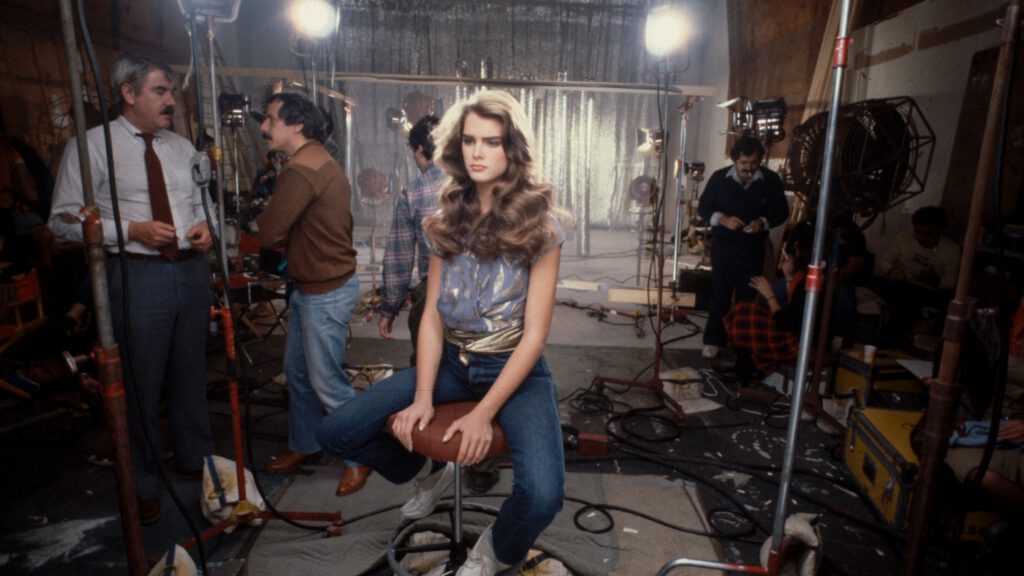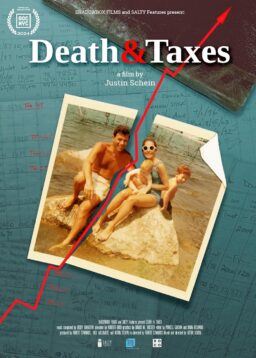It wouldn’t be Sundance without a half-dozen or so profile docs. It’s a form of non-fiction filmmaking that often drives me a little crazy as filmmakers too commonly dismiss form to plant a camera down in front of someone willing to tell anecdotes about somebody they used to know. Often called a “talking head doc,” these movies require minimal effort and typically offer very little insight. Occasionally, a bio-doc can break form (like Brett Morgen’s fantastic “Moonage Daydream”), but too many documentary creators are content to adopt a “then this happened” approach to telling the private story of a public life. Three profile docs from Sundance almost feel like they’re in conversation with each other, targeting the thousands of people in the audience who were children of the ‘80s that read Judy Blume, listened to the Indigo Girls, and watched Brooke Shields. And yet, what’s funny is how these three films prove that even the bio-doc can range in quality as there’s a distinct hierarchy in these three efforts.
The best of the three by far is Lana Wilson’s “Pretty Baby: Brooke Shields,” a study of a woman who was hyper-sexualized by the Hollywood machine at a very young age. Wilson’s film makes it clear how much the young Shields was let down by an industry that too often saw her as a commodity instead of a human being. However, unlike many child stars, Shields never succumbed to the potential demons around her, seeming today like a happy, well-adjusted human being. She’s a remarkable interview subject, someone who eloquently tells her life story in a way that feels like it organically contains a few questions she has yet to answer fully (like most of us). Profile doc interviews often sound overly scripted, but Shields is a wonderful conversationalist, telling her life story in a way that sounds like how she would one-and-one. Combined with excellent structuring by Wilson, who did the Taylor Swift doc “Miss Americana,” this one proves that a standard profile doc can still be entertaining.
From a very young age, Brooke Shields was placed on a pedestal because of her beauty. Photographers and filmmakers wanted to use her to sell their products or star in their films, and it’s clear that too many people in these early days stopped to ask questions about what it meant to sexualize a child. (Or they asked and decided they didn’t care.) Stories about the production of “Pretty Baby,” “The Blue Lagoon,” and “Endless Love” are fascinating windows into a different era. Shields often says that they couldn’t be made today, and one hopes she’s right, although the over-sexualization of child actors certainly hasn’t dissipated entirely. And most of them don’t come through this corrupt system as whole as Shields.
Wilson’s smartest choice—somewhat similar to Davis Guggenheim’s approach to the Sundance-premiering “Still: A Michael J. Fox Story”—is to give the space to Shields herself. She assists the interviews with clips and outsiders (including some high-profile friends like Laura Linney and Drew Barrymore), but this is Shields’ show. She’s very open about everything, including telling a story for the first time about a rape experience and opening up about her post-partum depression. Shields still battles some of the issues around her youth, like her mother’s role, but there’s also such confidence and joy, especially in late scenes with her family. It makes the piece both a cautionary tale and a survivor’s story. And it will speak to people still processing their own traumas.

There’s something in the way the Indigo Girls spoke to people’s trauma too. The subject of Alexandria Bombach’s “It’s Only Life After All” were a formative part of my youth, along with so many loyal fans. Some of the best material in Bombach’s film reveals the connection that people felt to Amy Ray and Emily Saliers, one that continues to have an influence to this day, but that they often seem to dismiss that angle with a self-effacing comment. It’s hard to believe that something that you love to do could have a life-changing impact on those who hear it, but the best parts of Bombach’s film reveal how none of that is calculated for these two, reminding us once again that just being true to your passion and your beliefs can be enough to make a change in this world.
In the late ‘80s and early ‘90s—when this writer was in high school and college, by the way—Indigo Girls were massive in certain circles (the ones I was in, for sure). Their music felt unapologetically true to its creators, never calculated in a way to get fans or airplay. And that truth spoke to people who felt like they didn’t have a voice in mainstream radio, especially after Saliers and Ray came out and become icons for an entire community. It felt like the Indigo Girls used their power for good, becoming outspoken supporters for people like Indigenous activist Winona LaDuke. And yet they’re so casual about their roles in both music and activism. None of it ever feels like an act, just an understanding of how they could amplify their interests through their music and fandom.
Bombach is lucky to have a massive archive of material from their entire career from which to construct a film, but that can be a curse too as “It’s Only Life After All” wears out its welcome at close to two hours, often repeating itself as it unfolds. There’s a tighter, more focused version of this story that still has the same thrust without feeling like it drags out the concert a little too long. Still, fans will adore it, and they’re the ones who really matter.

The fans are kind of all that matters to Judy Blume too. Her connection with them, revealed in Davina Pardo and Leah Wolchok’s “Judy Blume Forever,” is undeniably moving. The author of so many beloved books felt like a person that readers could trust, often even more than their parents, and when Blume opens boxes of letters from fans, many of whom she responded to, her impact on the world is remarkably moving. Sadly, the movie around her doesn’t quite rise to her level. Blume is a massively influential writer, one who has never gotten quite the critical attention she deserves, but this movie seems content to hit all the chronological and career life markers instead of doing the work about what inspired Blume or how she inspired others. Blume is a charming interview subject, but one gets the impression that you could learn as much about her with a dinner conversation as you do here, and that’s a shame.
The main reason that Judy Blume mattered so much was that she trusted her readers. In one moment, readers talk about she would casually drop in references to things like masturbation that kids just weren’t (and aren’t even today) allowed to talk about, recognizing that they’re a fact of adolescent life. Blume never paints herself as a trailblazer as much as someone who almost casually refused to give in to puritanical expectations. Don’t get me wrong. She eventually knew the impact she was having—a scene in which she takes on blowhard Pat Buchanan on an old talk show is marvelous—but it’s interesting to see how none of this was overly calculated. She didn’t write about hot-button issues to sell books; she wrote about youth in a truthful way, and that’s why it mattered then and now.
Judy Blume spoke to people at a time in their lives when it felt like they didn’t have a voice. The directors of “Judy Blume Forever” interview some of those subjects, but it all feels too shallow. We don’t need Samantha Bee talking about why Judy Blume mattered to readers. If we’re watching this, we know Judy Blume mattered. The casual, unexpected, less-scripted stuff here works much better. When Blume opens letters from the dozens of boxes of them she received over the years—I loved a kid writing, “Please send me the facts of life in number order”—the film gains an in-the-moment emotional power that it too often lacks otherwise. There’s just a bit too much here that feels overly calculated and edited, especially for a writer who never edited how completely she spoke from her heart.












